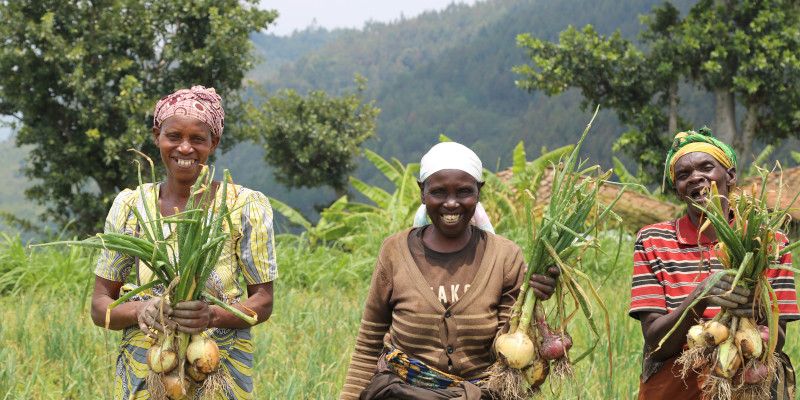
Improving Women’s Livelihoods Through Co-Operatives
When Mukeshimana Liberata started growing onions commercially a year ago, she did not know that this was going to be her big chance to improve her livelihood and realise some of her dreams.
Before joining a farmers’ group supported by the MARKUP Horticulture Value Chain (HVC) Project, the 50-year-old mother of nine used to grow beans, sweet potatoes, cabbages, carrots and onions on a 0.1 hectare plot, where she harvested less than 100 kilograms of onions a season. This was not sufficient to take care of her and her family.
Liberata, like many other farmers and vegetable producers in Nyamagabe district, was not aware of the use of quality seeds and the application of modern agricultural techniques. Her fortunes and those of her community changed when she joined a farmer group specialising in growing onions.
The HVC project supported farmers to come together in groups and cooperatives. Thus, they worked together on a larger portion of land, which led to greater productivity, better yields, and increased market opportunities for their produce.
Liberata and her farmers’ group took part in training courses where they learned how to apply modern farming technologies and link them to potential markets.
Through the training provided by the HVC Project implementing partner Conseil Consultatif des Femmes (COCOF), Liberata is now able to harvest 400 kilograms of onions instead of the 100 kilograms she used to get.
‘I used to harvest 100 kilograms of onions on 0.1 hectare of land. After I joined the farmer group, we received training and good quality seed. I now harvest 400 kilograms on the same piece of land,’ said Liberata.
She is now part of a group 102 farmers, who harvested five metric tons of onions from six hectares, and she has been linked to the local market ever since she started.
With the money earned from onions, Liberata has been able to buy a high-breed cow that produces milk for home consumption and for sale as well as organic manure for organic onion production.
She plans to buy more cows for each of her children and expand the land for onion production.
MARKUP also trains men and women on Gender Action Learning System (GALS), a community-led empowerment methodology that uses inclusionary principles to improve income, food, and nutrition security of vulnerable people in a gender-equitable manner.
Through the training, Liberata, who could not speak confidently in front of people before, is today the leader of a farmers’ group of about 100 members.
She has also established a weekly voluntary saving group for women where each member contributes 5,000 Rwandan francs per week.
‘I used to stay home and never attended meetings because I thought that was for men. GALS training allowed me and my colleagues to be confident and stand up for ourselves. Thanks to MARKUP trainings, I now lead men and women in our farmer group and have established a women’s voluntary saving group.’
As a group of farmers, they have plans to buy a truck that will transport the produce from the farm to various local marketplaces.